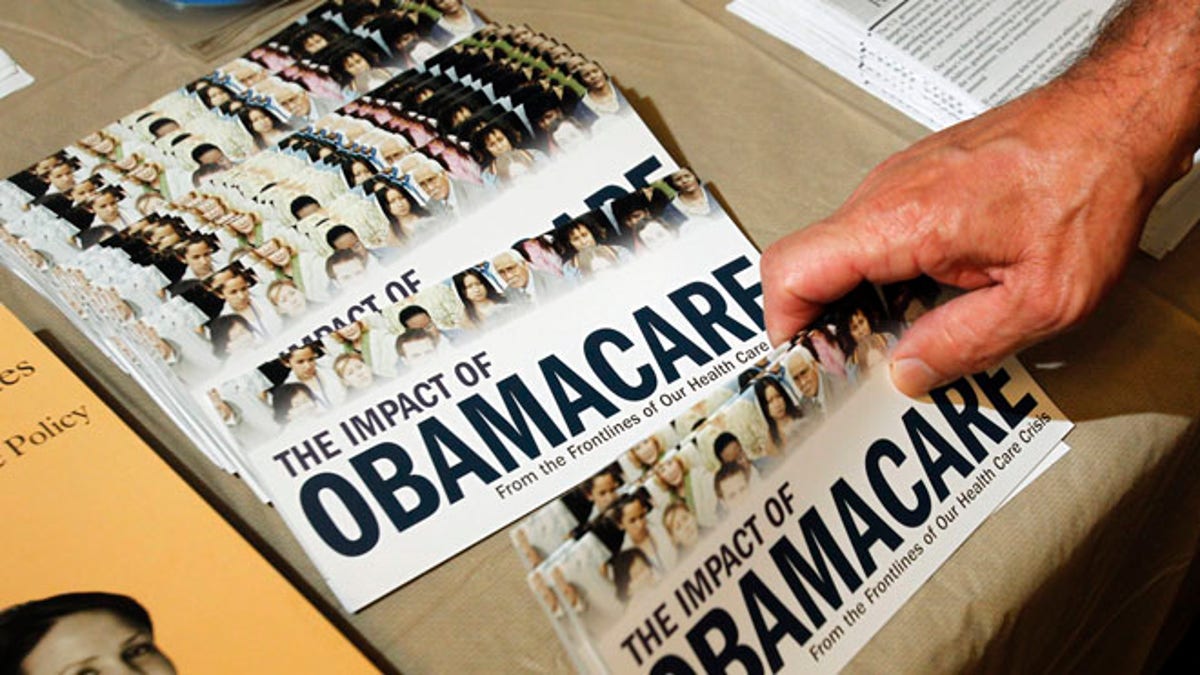
Oct. 27, 2012: A Tea Party member reaches for a pamphlet titled "The Impact of Obamacare", at a "Food for Free Minds Tea Party Rally" in Littleton, New Hampshire . (Reuters)
The ObamaCare endgame is coming into view. In Colorado, where ObamaCare enrollees face 20 percent premium hikes, voters will decide Nov. 8 whether to create a new single payer healthcare system. Said to cost $25 billion, the new ColoradoCare would be funded by a 10 percent payroll tax plus various other levies. Keep in mind that state’s entire budget is just $27 billion.
Likewise, the president last week said the antidote to the loss of major private insurers from ObamaCare is the creation of a government-backed insurer to provide competition on exchanges that have none. Who knows how much that would cost or if it could even be successful? I guess he’s hoping the American people failed to notice that $330 billion in taxpayer dollars has already been spent on Obamacare, with lackluster results.
In the same speech made in Miami, the president said we should regard ObamaCare as “a starter home. “It’s a lot better than not having a home,” he said. “But over time, you hope you can make improvements.”
But healthcare isn’t a starter home. Whether ObamaCare or more broadly, the nation’s health care system more broadly, operates efficiently and well is important. Millions of lives hang in the balance. As one of those people relying on the nation’s healthcare system to deliver recovery from a life threatening disease, each tweak, each change in the nation’s healthcare policy sends shivers down my spine. Will access to my doctor be limited? Will my costs rise? Will I be forced to pay more? And, what happens if the disease recurs?
You may wonder why I care about ObamaCare since I get my coverage from a private employer. But the truth is that the Affordable Care Act’s influence doesn’t just exist inside the gates of that program. Massive mergers have changed the way physicians do business all over the country. Nurses spend unconscionable hours filling out online forms. Premiums and deductibles aren’t just on the rise for Obamacare enrollees, but for everyone. The law changed the entire healthcare industry. There is no way to back out smoothly and return to a system that clearly worked better.
That ObamaCare is slowly coming apart at the seams is no secret. In Florida, where the president was making his comments, the number of insurers has winnowed from 18 to a slim five options. Deductibles for Obamacare are up 23 percent.
Across the country, the situation is much the same. Minnesota Gov. Mark Dayton, a Democrat, was an early and ardent supporter of ObamaCare. But even he was forced to admit that the program is no longer affordable. Premiums in that state are set to rise 50 to 67 percent for 2017 ObamaCare coverage.
Twenty percent of potential Obamacare enrollees across the country will face a single option as they attempt to sign up for the president’s healthcare scheme, which the left still refers to as a “marketplace.” It’s not. Yet, it’s a fair bet that the IRS will still force people without coverage to pay the individual mandate tax even though so many of them will be denied choices that fit their particular situation.
The nation’s largest and most deep-pocketed insurers, United Healthcare, Aetna and Humana, didn’t drop out of the exchanges because they weren’t making enough money on ObamaCare. They dropped out because they were losing money on ObamaCare. Hundreds of millions of dollars. We’ve always known that the ACA wasn’t an elegant piece of legislation. As Nancy Pelosi famously said, we’ll know what’s in it when we read it, but now it’s clear that the ACA is simply unworkable.
While the ObamaCare political football gets batted back and forth between Republicans and Democrats, millions of Americans are praying that they don’t get hurt in the process. And, they don’t want a starter home. They want top notch health care that they can choose.
